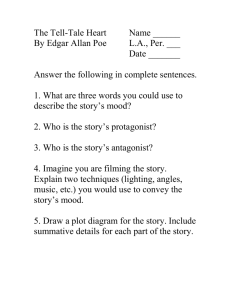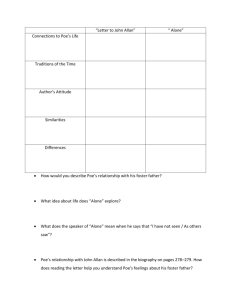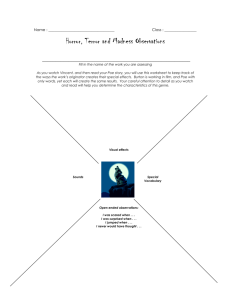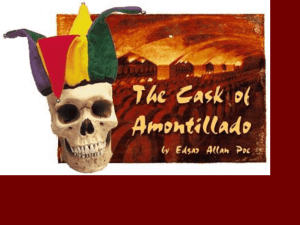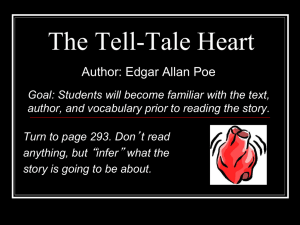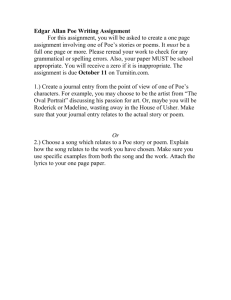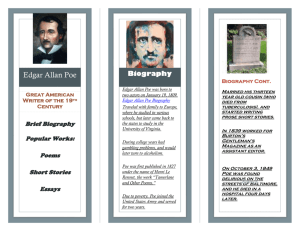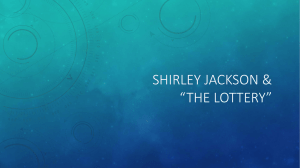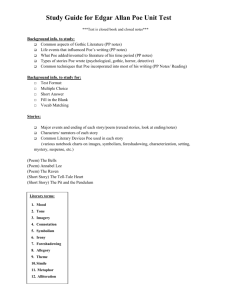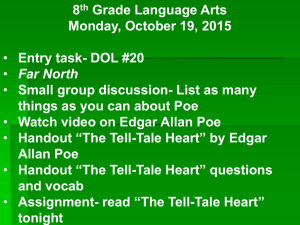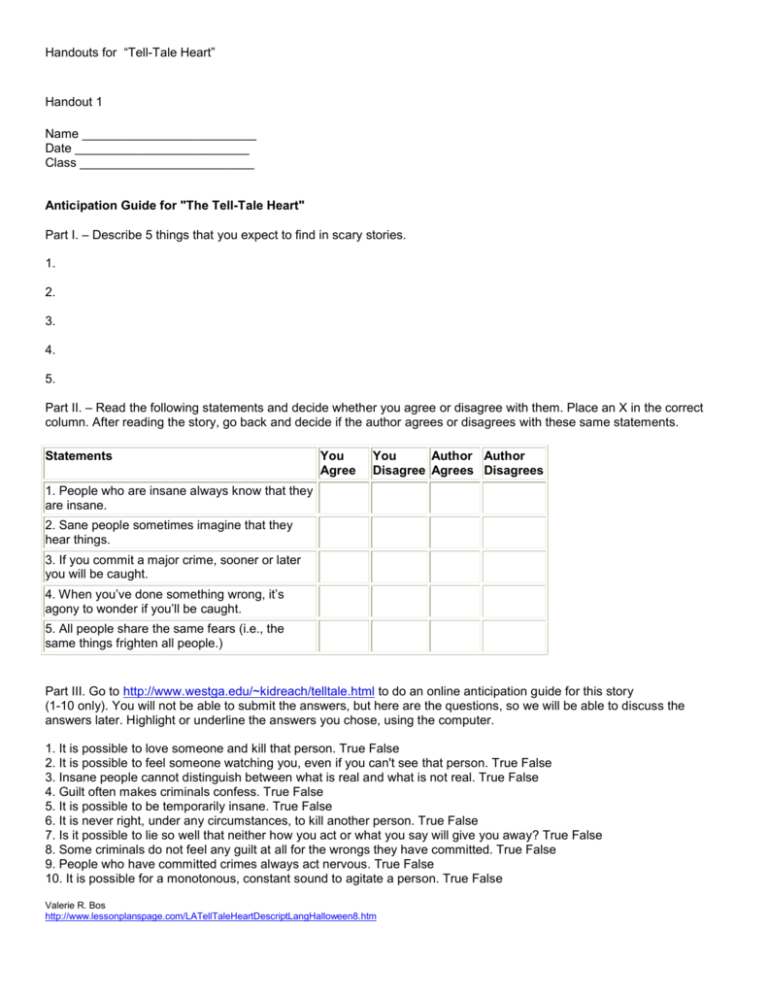
Handouts for “Tell-Tale Heart”
Handout 1
Name _________________________
Date _________________________
Class _________________________
Anticipation Guide for "The Tell-Tale Heart"
Part I. – Describe 5 things that you expect to find in scary stories.
1.
2.
3.
4.
5.
Part II. – Read the following statements and decide whether you agree or disagree with them. Place an X in the correct
column. After reading the story, go back and decide if the author agrees or disagrees with these same statements.
Statements
You
Agree
You
Author Author
Disagree Agrees Disagrees
1. People who are insane always know that they
are insane.
2. Sane people sometimes imagine that they
hear things.
3. If you commit a major crime, sooner or later
you will be caught.
4. When you’ve done something wrong, it’s
agony to wonder if you’ll be caught.
5. All people share the same fears (i.e., the
same things frighten all people.)
Part III. Go to http://www.westga.edu/~kidreach/telltale.html to do an online anticipation guide for this story
(1-10 only). You will not be able to submit the answers, but here are the questions, so we will be able to discuss the
answers later. Highlight or underline the answers you chose, using the computer.
1. It is possible to love someone and kill that person. True False
2. It is possible to feel someone watching you, even if you can't see that person. True False
3. Insane people cannot distinguish between what is real and what is not real. True False
4. Guilt often makes criminals confess. True False
5. It is possible to be temporarily insane. True False
6. It is never right, under any circumstances, to kill another person. True False
7. Is it possible to lie so well that neither how you act or what you say will give you away? True False
8. Some criminals do not feel any guilt at all for the wrongs they have committed. True False
9. People who have committed crimes always act nervous. True False
10. It is possible for a monotonous, constant sound to agitate a person. True False
Valerie R. Bos
http://www.lessonplanspage.com/LATellTaleHeartDescriptLangHalloween8.htm
Handout 2
VOCABULARY LIST FOR EDGAR ALLAN POE’S "THE TELL-Tale HEART"
Read words and definitions carefully. Look up definition of any word that you feel needs more defining at
http://www.wordcentral.com/. Add your definition. There are sentences to fill in on the next page.
1. acute - adjective - sharp or keen (as in an acute sense of hearing)
2. audacity - noun - presumption; insolence; impudence; bold courage; daring
3. derision - noun - contempt or ridicule
4. foresight - noun - a looking forward; the power to see what will happen; thoughtful regard for the future
5. mockery - noun - a person or thing receiving or deserving ridicule or derision; an impertinent imitation
6. premises - noun - a piece of real estate; a house or building and its land
7. profound - adjective - marked by intellectual depth; deeply or intensely felt
8. raved - verb - to talk wildly with excessive enthusiasm (about someone or something)
9. refrained - verb - held back; kept from doing something
10. sagacity - noun - keen perception or penetrating intelligence; sound judgment
11. stifled - verb - to suppress or hold back; to check or stop
12. unperceived - verb - not seen or understood
13. vehemently - adverb - acting with great force; violently or forcefully
14. vex - verb - to disturb or annoy; to terrify
15. waned - verb - to become less intense (as in The light of the moon waned as dawn approached.)
Definitions from http://www.thesolutionsite.com/lpnew/lesson/961/voclisttelltaleheart.doc
Handout 3
Name:
Date:
Class:
Vocabulary Sentences for "The Tell-Tale Heart" by Edgar Allan Poe
Directions: Write the vocabulary word that fits each sentence. Highlight the ** before you begin to write. Then go back and
underline or highlight the word you wrote.
1. When you make a ** of something, you are making fun of it.
2. The police found the evidence on the **.
3. The speaker said his sense of hearing was **.
4. A person who displays ** has a very high opinion of himself.
5. He was upset by the ** of his friends.
6. Sandy has ** , she plans ahead.
7. His knowledge of the subject was **.
8. The speaker ** at the policemen.
9. Wisely, Sarah ** from arguing with her mother.
10. Few of us will ever be said to have **.
11. Randy ** a laugh when he saw the play.
12. ** danger is the most dangerous because you don’t see what is coming.
13. The defendant ** denied having committed the crime.
14. If you ** someone, you have upset and confused them.
15. The light of the moon ** as the dawn approached.
Sentences from http://www.thesolutionsite.com/lpnew/lesson/961/vocsentpoeheart.doc
Handout 4
Name _________________________
Date _________________________
Class _________________________
“The Tell-Tale Heart”
Literary Terms to Know
These are literary terms you should become familiar with. You should be able to discuss how Poe uses each one of these
in his story.
characterization: the author's expression of a character's personality through the use of action, dialogue, thought, or
commentary by the author or another character.
conflict: the struggle within the story. Character divided against self, character against character, character against
society, character against nature, character against God. Without it, there is no story.
dialogue: vocal exchange between two or more characters. One of the ways in which plot, character, action, etc. are
developed.
imagery: the collection of images within a literary work. Used to evoke atmosphere, mood, tension. For example, images
of crowded, steaming sidewalks flanking streets choked with lines of shimmering, smoking cars suggests oppressive heat
and all the psychological tensions that go with it.
point of view: the vantage point from which the author presents action of the story. Who is telling the story? An allknowing author? (third person-omniscient) A voice limited to the views of one character? (third person-limited) The voice
and thoughts of one character? (first person) Does the author change point of view in the story? Why? Point of view is
often considered the technical aspect of fiction which leads the critic most readily into the problems and meanings of the
story.
symbol: related to imagery. It is something which is itself yet stands for or means something else. It tends to be more
singular, a bit more fixed than imagery. For example, in Lessing's "A Woman on a Roof," the brief red sun suit seems to
symbolize the woman's freedom and independence from externally imposed standards of behavior.
tone: suggests an attitude toward the subject which is communicated by the words the author chooses. Part of the range
of tone includes playful, somber, serious, casual, formal, ironic. Important because it designates the mood and effect of a
work.
Handout 5
Name:
Date:
Class:
Writing a news story
News reporters use this guide when writing a story. Use this chart to fill in the facts in Tell-Tale Heart. Then write a
paragraph that could be submitted as a news story. Make up your own headline for the story.
What happened?
Who was there?
Why did it happen?
When did it happen?
Where did it happen?
Now you are ready to write your news story.
Handout 6--2 pages + story
Name __________________________
Date __________________________
Class __________________________
"The Tell-Tale Heart"
by Edgar Allan Poe
Essay Question:
How does Edgar Allan Poe keep the reader in suspense in
"The Tell-Tale Heart"?
To prepare yourself to answer this in a good essay, do the following:
1. In your own words, explain what happens in the story.
2. In a paragraph, describe the character telling the story.
3. Reread the story and underline all the words that suggest fear and horror. (Attached)--Teachers, you may wish to copy
and paste this into a separate document for them to use on a word processor, or copy and print it out for them.
Edgar Allan Poe uses language and literary devices to make the reader
feel tense during the story.
4. How does the first sentence create suspense?
Poe talks about TIME throughout the story:
5. Find three quotations to do with TIME going slowly in the story.
6. Find two quotations to do with TIME going fast within the story.
7. Write a paragraph about why Poe mentions TIME so much in the
story, and why he changes the pace of the story from slow to fast.
Poe repeats words a great deal in the story i.e. "Very, very slowly".
8. Write down 3 examples of repetition and explain why Poe repeats words and phrases.
Poe uses noises to create atmosphere in the story. The main character says "I heard many things in hell."
9. Fill in this table (Find 2 more noises.)
Noise (Quote) Effect on the reader
Example "Hinges
creaked"
Reminds the reader of horror films: they
want to know who is behind the door!
Reason why Poe chose the noise
Slow action, spooky noise, associated with
old houses that have been neglected.
Descriptive Language: Poe describes everything in great detail so that the reader can imagine the story like a film. He
uses lots of imagery.
10. List some of the evil words that he uses: what effect do they have
in the story and on the reader?
11. How does he make the "eye" sound disgusting?
12. How does he make the death sound disgusting?
The story is written in first person narrative by the main character.
13. List 3 quotations where the main character directly refers to the reader. Why does Poe do this?
14. Why does Poe have the murderer tell the story?
15. In your own words, explain why this story gripped your imagination.
Well Done! You're now ready to write the essay!!
Here is the question again:
How does Edgar Allan Poe keep the reader in suspense in "The Tell-Tale Heart"?
This unit of work was found free at www.englishresources.co.uk, but it no longer is a link.
© 1999 English Resources, all rights reserved
Part of Handout 6
Name ______________________________
Date ______________________________
Class ______________________________
Identifying tone in “The Tell-Tale Heart”
Directions: Reread the story and underline or highlight or underline all the words that suggest fear and horror.
by Edgar Allan Poe
(1843)
TRUE! --nervous --very, very dreadfully nervous I had been and am; but why will you say that I am mad? The disease had
sharpened my senses --not destroyed --not dulled them. Above all was the sense of hearing acute. I heard all things in the
heaven and in the earth. I heard many things in hell. How, then, am I mad? Hearken! and observe how healthily --how
calmly I can tell you the whole story. It is impossible to say how first the idea entered my brain; but once conceived, it
haunted me day and night. Object there was none. Passion there was none. I loved the old man. He had never wronged
me. He had never given me insult. For his gold I had no desire. I think it was his eye! yes, it was this! He had the eye of a
vulture --a pale blue eye, with a film over it. Whenever it fell upon me, my blood ran cold; and so by degrees --very
gradually --I made up my mind to take the life of the old man, and thus rid myself of the eye forever.
Now this is the point. You fancy me mad. Madmen know nothing. But you should have seen me. You should have seen
how wisely I proceeded --with what caution --with what foresight --with what dissimulation I went to work! I was never
kinder to the old man than during the whole week before I killed him. And every night, about midnight, I turned the latch of
his door and opened it --oh so gently! And then, when I had made an opening sufficient for my head, I put in a dark
lantern, all closed, closed, that no light shone out, and then I thrust in my head. Oh, you would have laughed to see how
cunningly I thrust it in! I moved it slowly --very, very slowly, so that I might not disturb the old man's sleep. It took me an
hour to place my whole head within the opening so far that I could see him as he lay upon his bed. Ha! would a madman
have been so wise as this, And then, when my head was well in the room, I undid the lantern cautiously-oh, so cautiously
--cautiously (for the hinges creak Upon the eighth night I was more than usually cautious in opening the door. A watch's
minute hand moves more quickly than did mine. Never before that night had I felt the extent of my own powers --of my
sagacity. I could scarcely contain my feelings of triumph. To think that there I was, opening the door, little by little, and he
not even to dream of my secret deeds or thoughts. I fairly chuckled at the idea; and perhaps he heard me; for he moved
on the bed suddenly, as if startled. Now you may think that I drew back --but no. His room was as black as pitch with the
thick darkness, (for the shutters were close fastened, through fear of robbers,) and so I knew that he could not see the
opening of the door, and I kept pushing it on steadily, steadily.
I had my head in, and was about to open the lantern, when my thumb slipped upon the tin fastening, and the old man
sprang up in bed, crying out --"Who's there?" I kept quite still and said nothing. For a whole hour I did not move a muscle,
and in the meantime I did not hear him lie down. He was still sitting up in the bed listening; --just as I have done, night
after night, hearkening to the death watches in the wall.
Presently I heard a slight groan, and I knew it was the groan of mortal terror. It was not a groan of pain or of grief --oh, no!
--it was the low stifled sound that arises from the bottom of the soul when overcharged with awe. I knew the sound well.
Many a night, just at midnight, when all the world slept, it has welled up from my own bosom, deepening, with its dreadful
echo, the terrors that distracted me. I say I knew it well. I knew what the old man felt, and pitied him, although I chuckled
at heart. I knew that he had been lying awake ever since the first slight noise, when he had turned in the bed. His fears
had been ever since growing upon him. He had been trying to fancy them causeless, but could not. He had been saying
to himself --"It is nothing but the wind in the chimney --it is only a mouse crossing the floor," or "It is merely a cricket which
has made a single chirp." Yes, he had been trying to comfort himself with these suppositions: but he had fo When I had
waited a long time, very patiently, without hearing him lie down, I resolved to open a little --a very, very little crevice in the
lantern. So I opened it --you cannot imagine how stealthily, stealthily --until, at length a simple dim ray, like the thread of
the spider, shot from out the crevice and fell full upon the vulture eye.
It was open --wide, wide open --and I grew furious as I gazed upon it. I saw it with perfect distinctness --all a dull blue, with
a hideous veil over it that chilled the very marrow in my bones; but I could see nothing else of the old man's face or
person: for I had directed the ray as if by instinct, precisely upon the damned spot. And have I not told you that what you
mistake for madness is but over-acuteness of the sense? --now, I say, there came to my ears a low, dull, quick sound,
such as a watch makes when enveloped in cotton. I knew that sound well, too. It was the beating of the old man's heart. It
increased my fury, as the beating of a drum stimulates the soldier into courage.
But even yet I refrained and kept still. I scarcely breathed. I held the lantern motionless. I tried how steadily I could
maintain the ray upon the eve. Meantime the hellish tattoo of the heart increased. It grew quicker and quicker, and louder
and louder every instant. The old man's terror must have been extreme! It grew louder, I say, louder every moment! --do
you mark me well I have told you that I am nervous: so I am. And now at the dead hour of the night, amid the dreadful
silence of that old house, so strange a noise as this excited me to uncontrollable terror. Yet, for some minutes longer I
refrained and stood still. But the beating grew louder, louder! I thought the heart must burst. And now a new anxiety
seized me --the sound would be heard by a neighbour! The old man's hour had come! With a loud yell, I threw open the
lantern and leaped into the room. He shrieked once --once only. In an instant I dragged him to the floor, and pulled the
heavy bed over him. I then smiled If still you think me mad, you will think so no longer when I describe the wise
precautions I took for the concealment of the body. The night waned, and I worked hastily, but in silence. First of all I
dismembered the corpse. I cut off the head and the arms and the legs.
I then took up three planks from the flooring of the chamber, and deposited all between the scantlings. I then replaced the
boards so cleverly, so cunningly, that no human eye --not even his --could have detected any thing wrong. There was
nothing to wash out --no stain of any kind --no blood-spot whatever. I had been too wary for that. A tub had caught all -ha! ha!
When I had made an end of these labors, it was four o'clock --still dark as midnight. As the bell sounded the hour, there
came a knocking at the street door. I went down to open it with a light heart, --for what had I now to fear? There entered
three men, who introduced themselves, with perfect suavity, as officers of the police. A shriek had been heard by a
neighbour during the night; suspicion of foul play had been aroused; information had been lodged at the police office, and
they (the officers) had been deputed to search the premises.
I smiled, --for what had I to fear? I bade the gentlemen welcome. The shriek, I said, was my own in a dream. The old man,
I mentioned, was absent in the country. I took my visitors all over the house. I bade them search --search well. I led them,
at length, to his chamber. I showed them his treasures, secure, undisturbed. In the enthusiasm of my confidence, I
brought chairs into the room, and desired them here to rest from their fatigues, while I myself, in the wild audacity of my
perfect triumph, placed my own seat upon the very spot beneath which reposed the corpse of the victim. The officers were
satisfied. My manner had convinced them. I was singularly at ease. They sat, and while I answered cheerily, they chatted
of familiar things. But, ere long, I felt myself getting pale and wished them gone. My head ached, and I fancied a ringing in
my ears: but still they sat and still chatted. The ringing became more distinct: --It continued and became more distinct: I
talked more freely to get rid of the feeling: but it continued and gained definiteness --until, at length, I found that the noise
was not within my ears.
No doubt I now grew very pale; --but I talked more fluently, and with a heightened voice. Yet the sound increased --and
what could I do? It was a low, dull, quick sound --much such a sound as a watch makes when enveloped in cotton. I
gasped for breath --and yet the officers heard it not. I talked more quickly --more vehemently; but the noise steadily
increased. I arose and argued about trifles, in a high key and with violent gesticulations; but the noise steadily increased.
Why would they not be gone? I paced the floor to and fro with heavy strides, as if excited to fury by the observations of the
men --but the noise steadily increased. Oh God! what could I do? I foamed --I raved --I swore! I swung the chair upon
which I had been sitting, and grated it upon the boards, but the noise arose over all and continually increased. It grew
louder --louder --louder! And still the men chatted pleasantly, and smiled. Was it possible they heard not? Almighty God! -no, no! They heard! --they "Villains!" I shrieked, "dissemble no more! I admit the deed! --tear up the planks! here, here! --It
is the beating of his hideous heart!"
-- THE END
Handout 7
Name:
Date:
Class:
This quiz is designed to be taken on the computer. Go back to the web site to copy and paste this quiz on your word
processor for students to take.
VOCABULARY QUIZ "THE TELL-TALE HEART" BY EDGAR ALLAN POE
PART I. SPELLING - CHOOSE THE CORRECT SPELLING FOR EACH WORD BY UNDERLINING OR HIGHLIGHTING
THE CORRECT ANSWER USING THE COMPUTER COMMANDS. (In AppleWorks, you will have to use underlining: U)
a. veix b. vex c. vexe
a. raeved b. reaved c. raved
a. forsight b. forseight c. foresight
a. acute b. aceute c. aucute
a. sagaecity b. sagacity c. saigacity
a. waned b. waened c. waneed
a. stiefled b. steifled c. stifled
a. proufound b. profound c. profuond
a. derision b. dearision c. deresion
a. refrained b. rifrained c. refreined
a. unpercieved b. unperceived c. unperceivid
a. mockary b. mockeary c. mockery
a. auadacity b. audacity c. audaucity
a. premises b. preimesis c. preemeisis
a. vehemantly b. vehimently c. vehemently
Scroll down for Part II
II. DEFINITIONS: MATCH THE VOCABULARY WORD WITH ITS DEFINITION BY WRITING THE LETTER OF THE
CORRECT DEFINITION IN THE BOX IN FRONT OF THE WORD. (You must click twice in the box to get your cursor
there.)
waned
a. talked wildly, ranted
acute
b. lost strength , ebbed , lost intensity
vex
c. reckless daring , impudence, boldness
audacity
d. sharp, keen
raved
e. provoke, harass, distress deeply
foresight
f. a person to be made fun of , laughingstock
unperceived
g. having or showing great understanding
mockery
h. unnoticed
derision
i. the power to see or know beforehand what is likely to happen
profound
j. contempt , ridicule , scornful laughter
refrained
k. kept back or down , suppressed
premises
l. sound judgment , shrewdness
sagacity
m. a house or building with its grounds
vehemently
n. acting with strong feeling , forcefully
stifled
o. held back , restrained
Scroll down for Part III
Part III
PARTS OF SPEECH : CHOOSE THE CORRECT PART OF SPEECH FOR EACH WORD. Write n. after the nouns, v.
after the verbs, adj. after the adjectives, and adv. after the adverbs.
waned
acute
vex
audacity
vehemently
derision
unperceived
foresight
stifled
mockery
sagacity
premises
refrained
profound
raved
Quiz found at http://www.thesolutionsite.com/lpnew/lesson/961/vocbularyquizpoe.doc
Handout 8
Name _______________________________
Date _______________________________
Class _______________________________
“The Tell-Tale Heart”
Quiz Type: Multiple Choice
Directions: Choose the correct answer by underlining or highlighting the correct answer, using the computer commands.
1) The main character is the _______________.
a) old man
b) policeman
c) murderer
2) The speaker thinks people think of him as ________.
a) odd
b) mad
c) brilliant
3) Of his five senses he feels his_______ is most acute.
a) smell
b) sight
c) hearing
4) The murderer says he _______ the old man.
a) loved
b) hated
c) was indifferent to
5) The speaker killed the old man because of his________.
a) heart
b) eye
c) tattoo
6) For ____nights the speaker practiced getting into the old man's room.
a) six
b) seven
c) eight
7) When the speaker tried to open the lantern, his ______ slipped and he made a noise.
a) hand
b) thumb
c) finger
8) When the old man groaned, the speaker said it was a groan of _______.
a) pain
b) grief
c) terror
9) The police came at _____AM.
a) three
b) four
c) five
10) The police find out the speaker is the murderer because of _________.
a) clues
b) witnesses
c) his confession
Quiz from http://www.thesolutionsite.com/lpnew/lesson/961/compquizheart.doc
Handout 9
Name ______________________________
Date ______________________________
Class ______________________________
Point of View in “The Tell-Tale Heart”
This story is told in first-person point of view. The first-person narrator is a wonderful way to tell a story because it makes
the story seem more believable, and the reader really gets to know the character. However, the story is limited to that
person’s perception. The narrator in this story is unreliable because we know from the beginning that he is insane. Your
story should be told in a minimum of 250 words.
Retell the story from the point of view of another character (Choose one):
The old man
One of the officers
The next door neighbor

